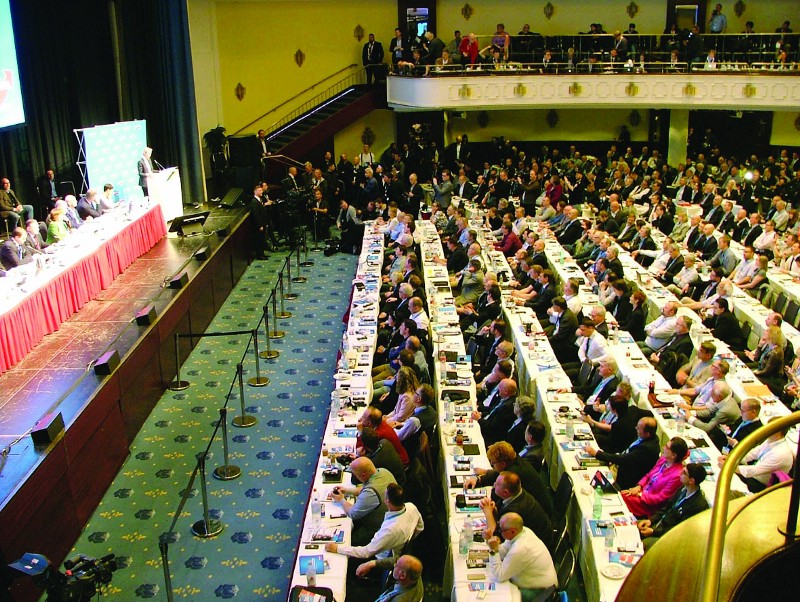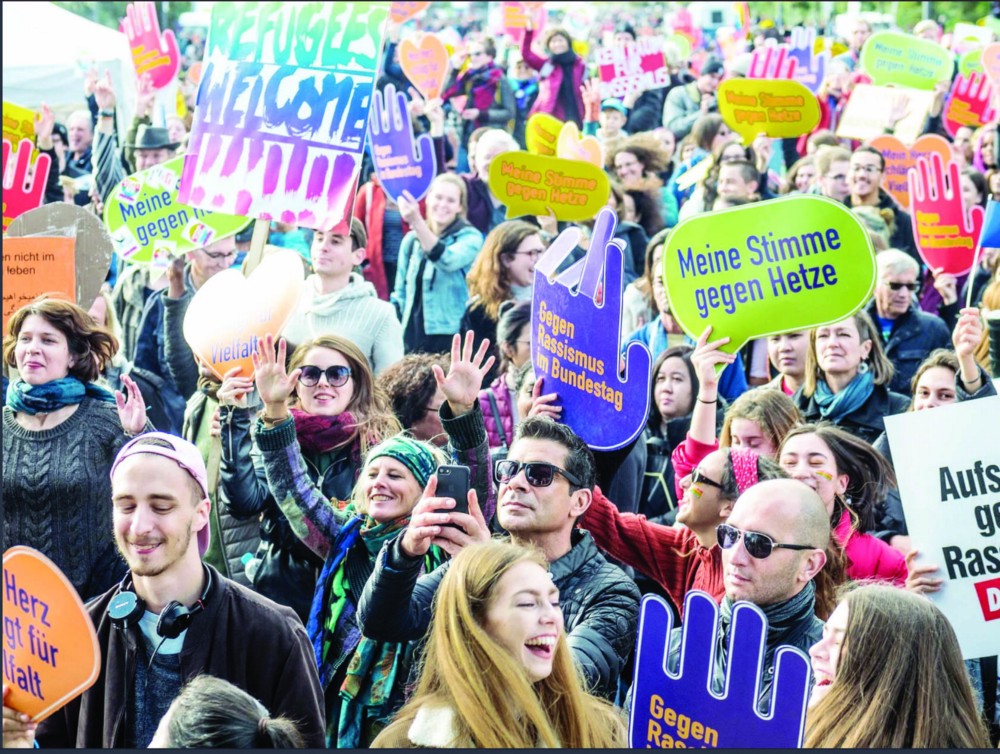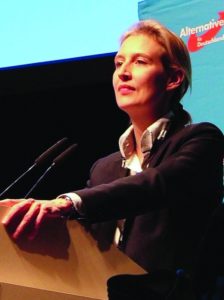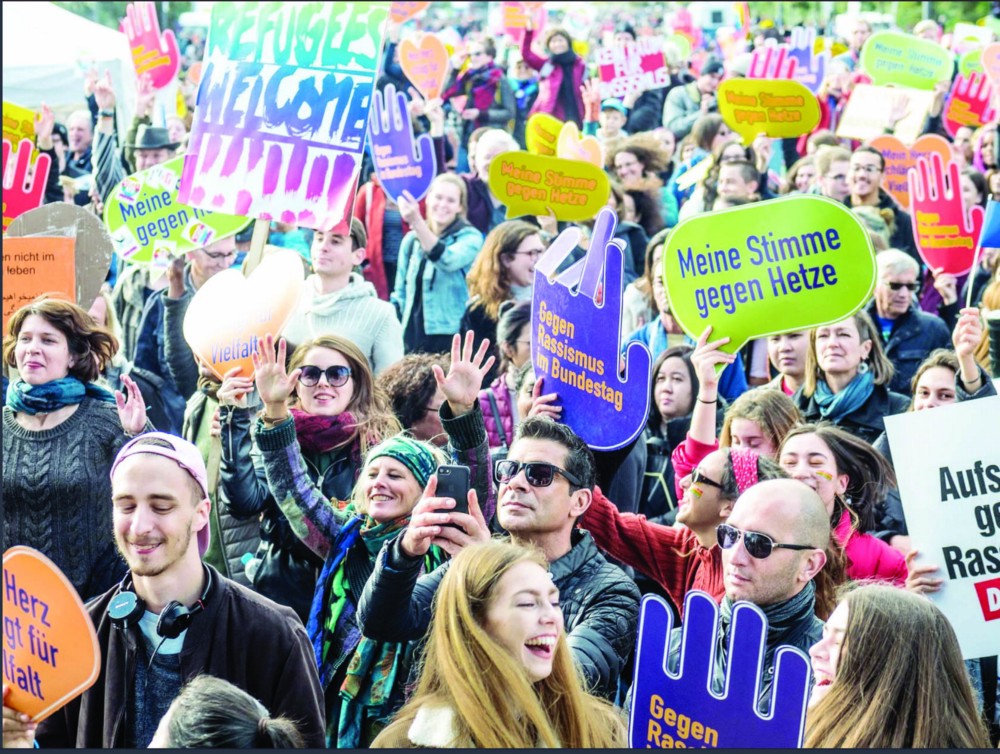Ulf Aminde, an artist and educator originally from the former FRG and currently living in Berlin, warns: “We cannot get back to the Third Reich period again!” Aminde recommends that all Germans constantly remember their radical past and understand the roots of the east and west divide as well as the current rise of racism and xenophobia in Germany. Nazism for him is not just a problem of the eastern regions but also of the west. “We have to understand that Nazism in Germany comes from a much earlier period. Following the Second World War, a lot of Nazis continued their life in post-war Germany and racism remained enmeshed in the political arrangement in West Germany.” While Aminde was able to join the post-war leftist-punk movement, there were many others who saw themselves aligned with the Nazi skinhead backlash in both the GDR and FRG.
For political activist Henriette Raddatz, who was born in Potsdam just after the fall of the wall, racism has been a grounding factor during her growing up years in the post-GDR period. She remembers the constant threats that left-leaning youth faced from the skinheads and recalls the wave of aggression that was present in places like Königs Wusterhausen, a small town in the vicinity of Berlin. For her, the neo-Nazi structures were a part of her reality. “The ideology of Nazism has been deeply rooted in Germany, due to a varied set of factors. And I want to work towards ameliorating it and educating people about it. But when people constantly tell me that the east is a racist place, I feel deeply upset and sad about this stereotyping. I feel that — rather than fighting together against racism — I have to first defend the east, where I was born and which is beyond what the people from the west are stating. The reality is much more complex.”
Franz Josef Strauss, an ex-leader of the CSU, a conservative party which is an ally of Merkel’s CDU and enjoys the leading position in Bavaria (Germany’s richest state), once claimed, “There must be no democratically legitimate party right of the CSU.” The regional conservative party which was formed right after the Second World War is known for its strong stance on Bavarian independence from Germany. The CSU is also known for its hardline towards non-Germans and has been trying to pull a strong cap on the immigration in the country. Ahead of the coalition building in the coming months with the CDU, the dominant south-eastern party, the CSU, wants to take a ‘Bavaria first’ approach and a subsequent shift towards the right, reports Deutsche Welle, Germany’s public international broadcaster.
Henrike Naumann, an artist from Zwickau, a city in Saxony, believes that the right has roots in conservatism and neo-liberalism of the former FRG and even in today’s western regions in Germany. “The GDR did a lot of harm to my family and constrained the possibilities for myself. But when I look back, I see the colossus of missed opportunities in the reunion process. Many people from the GDR-opposition, who started the ‘revolution’ did not want the union with the FRG and the western neoliberal system; instead, they wanted a ‘new GDR’, a better system. They were aware that things would not be easy if the GDR became a part of the FRG. Subsequently, they even drafted a Constitution for this new state. However, the CDU in the west kept pushing for the unification and achieved it. It was a rushed process and people continue to live with the implications of those decisions. Today, the East German economy has collapsed and many people have lost their jobs, houses and social security.” For Naumann, the east has become an easier target for being called racist because of the antipathy towards Soviet-style socialism and dictatorship which are cited as reasons for the right-wing radicalisation in the east. “But one cannot turn their eyes away from the right-wing activities and structural racism present in pan-Germany and which cannot just be based on simplistic antagonisms between the east and the west.”
“The GDR did a lot of harm to my family and constrained the possibilities for myself. But when I look back, I see the colossus of missed opportunities in the reunion process. Many people from the GDR-opposition, who started the ‘revolution’ did not want the union with the FRG and the western neoliberal system; instead, they wanted a ‘new GDR’, a better system
These antagonisms point back to a similar point made by Boyer, for whom the German identity has been shuffled between the two regions as a claim to a more sagacious and normal Germany. In this process though, many people, especially from the east, have lost claims to their own memories and cultures which have been purported to fit the idea of aVerfassungspatriotismus(constitutional patriotism), a term put together by Jürgen Habermas to denote the commitment for shared democratic values rather than a common national culture.
In conversation with Ilka Wild, a researcher in linguistics at the University of Erfurt in Thüringia, I discovered the semantical reproduction of memories of the GDR in Germany and its impact on the current identity struggle of the youth. “East Germany has not just been about the political system but also about the people. This is especially true for the way our histories are presented. This versetzung (transfer) to the west has not even been clearly represented in the many so-called GDR museums. History museums need to have more context and story to the mere representations that they showcase. This is especially important for the young people who were born after the reunion and have a hard time grasping our complex history.”
The stand on taking control of the German identity and calling people to be proud of their German heritage has been the mainstay of the AfD campaign. “It is time to put German interests first,” stated an AfD official in a conversation with the US-based National Public Radio. There is a general consensus amongst the people I speak to regarding the performative angle of the voter’s response through the AfD. They are of the opinion that the voters have lost trust in the governing parties and want to be acknowledged. Wild, also working as a radio journalist with the MDR, states: “I believe that the people who voted for AfD lament not being represented in the mainstream parties. The AfD was present here and in their cities, talking to them and reaching out to the local communities. People probably wanted to be noticed.”

AfD intra-party meeting
It is worth recalling the late German film and theatre director Christoph Schlingensief’s project, Wahlkampfzirkus ’98/Chance2000. This was a “social experiment arrangement” which spanned over a year with art shows, talks, educative events and the like in the heart of Berlin in 1998. The motto was Waehle dich selbst (Vote for Yourself) and provided a forum for the marginalised sections of society who felt left out by the political parties in the wake of the September 1998 general election, to cogitate over the possibility of voting for themselves as independent candidates. Schlingensief even started a political party called Chance2000 or Last Chance to congregate activism, politics, art and satire and present an alternative to the elites governing the country. While Schlingensief’s causticity might have seemed tomfoolery to some, it sought to stir up people and open doors for alternative possibilities.
In a similar vein Henriette, 27, currently living in Berlin and working with the refugee communities, asseverates, “Through these election results, one can observe that people wanted to speak out against the status quo by voting for AfD. People from both the eastern and western regions of Germany have been left out of the policy and welfare processes. But it does not help to blame someone for our own problems. Today people blame the immigrants for their problems and tomorrow it could be someone else.” She believes that the current problems need to be solved both at the structural level through a fair social economy and more investment in the east as well as at the individual level. “People from the east have to be more active, speak out and address their agency. Choosing racism and xenophobia will take us nowhere. Our history has been a witness.”
For Michaela Putzer, a 30-year-old woman from a small town near Dresden working in an innovation consulting company in Berlin, the ridicule and despise of AfD voters is not of much use. She instead believes that there needs to be tangible engagement with these people who feel that they have been left out of the German political system. “I know a few people in my close-knit network who voted for the AfD. I felt appalled by what they did and sought to talk to them. It was not easy though, and I was often met with aggression. But I believe that we should keep trying.” While engagement with the AfD voters is necessary, it is equally true that racism in Germany has planted itself in everyday lives and systems. The 2015 data from the German Ministry of the Interior provides shocking numbers: 14,000 Nazi-related crimes occurred in 2015 itself. The Guardian states that there were around three attacks a day against asylum seekers which were officially counted, at least until April 2016. Many believe that the anti-immigrant climate, like in the 1990s, is on the rise which could pressure the new government to make docile decisions, just like Helmut Kohl did in the 1990s post the then recurring spate of terrorist attacks.
However, Aminde, the artist working with refugees in Germany on a legal tool to convert their refugee status into art studentship, beams with hope on the early and ‘already set-in winter’ morning in Berlin. He places his cup of black coffee on the table and calmly tells me that Germans must remember where they came from. “Our identity has so many influences on it. Especially with the migration patterns. How can we conceive ourselves as being nationalistic or even Germans, for that matter?” Aminde finds the focus on nationalism a huge obstacle. He believes that he, alongwith his fellow German citizens, needs to remember their stories, memories and cultures but also take a stand against border controls, an unethical economy and controlled resources for only a few. “We need to build grounds for common humanity,” he says.
The need to build common grounds for humanity is not just a responsibility of the German State and its citizens but for people all across the world. The growth of the right has become an opportunity for those spearheading such ideologies and feeding off the fears of their supporters. And while immigration and identity conflicts are often cited as concerns for this radicalisation, these seem like residual issues in the face of the larger structural and historical questions. The analogies can be drawn with India as well.
[1]Source: Bundesagentur für Arbeit
*Name has been changed


